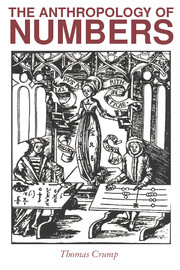Book contents
- Frontmatter
- Contents
- List of illustrations
- Preface
- Acknowledgements
- 1 The ontology of number
- 2 The cognitive foundations of numeracy
- 3 Number and language
- 4 Cosmology and ethnoscience
- 5 Economy, society and politics
- 6 Measurement, comparison and equivalence
- 7 Time
- 8 Money
- 9 Music, poetry and dance
- 10 Games and chance
- 11 Art and architecture
- 12 The ecology of number
- Notes
- References
- Index
- Cambridge Studies in Social and Cultural Anthropology
2 - The cognitive foundations of numeracy
Published online by Cambridge University Press: 05 June 2012
- Frontmatter
- Contents
- List of illustrations
- Preface
- Acknowledgements
- 1 The ontology of number
- 2 The cognitive foundations of numeracy
- 3 Number and language
- 4 Cosmology and ethnoscience
- 5 Economy, society and politics
- 6 Measurement, comparison and equivalence
- 7 Time
- 8 Money
- 9 Music, poetry and dance
- 10 Games and chance
- 11 Art and architecture
- 12 The ecology of number
- Notes
- References
- Index
- Cambridge Studies in Social and Cultural Anthropology
Summary
The mind of the individual
The simplest approach to the cognitive basis of numeracy is to assume that there is no essential differentiation between the minds of different individuals, nor between the different numerical systems which such individuals must learn to master as they grow up. The first assumption, although regarded as fundamental by psychologists, is essentially biological. Man is one species, so that, subject to certain pathological exceptions, the neurophysiology of man is completely uniform. The pathological exceptions, generally related to injuries to the brain and patent defects in the operation of the sensorimotor system of individual subjects, are important, for they dominate much of the experimental work done by psychologists interested in cognition. Experiments related to the normal case rely largely on statistical surveys, designed to demonstrate a normal distribution of some measurable index among the class being surveyed, which is likely to be defined according to such culturally neutral factors as age and sex. This leads, in the case of numeracy, to the second assumption made above, which is essentially logical or, perhaps better, epistemological. It has been stated in its simplest form by Stark (1958: 162): ‘Surely, there can only be one science of numbers, forever selfidentical in its content’. For heuristic reasons, I simply assume the truth of this proposition at the present stage of the argument in order to procede further with the discussion.
- Type
- Chapter
- Information
- The Anthropology of Numbers , pp. 14 - 30Publisher: Cambridge University PressPrint publication year: 1990

